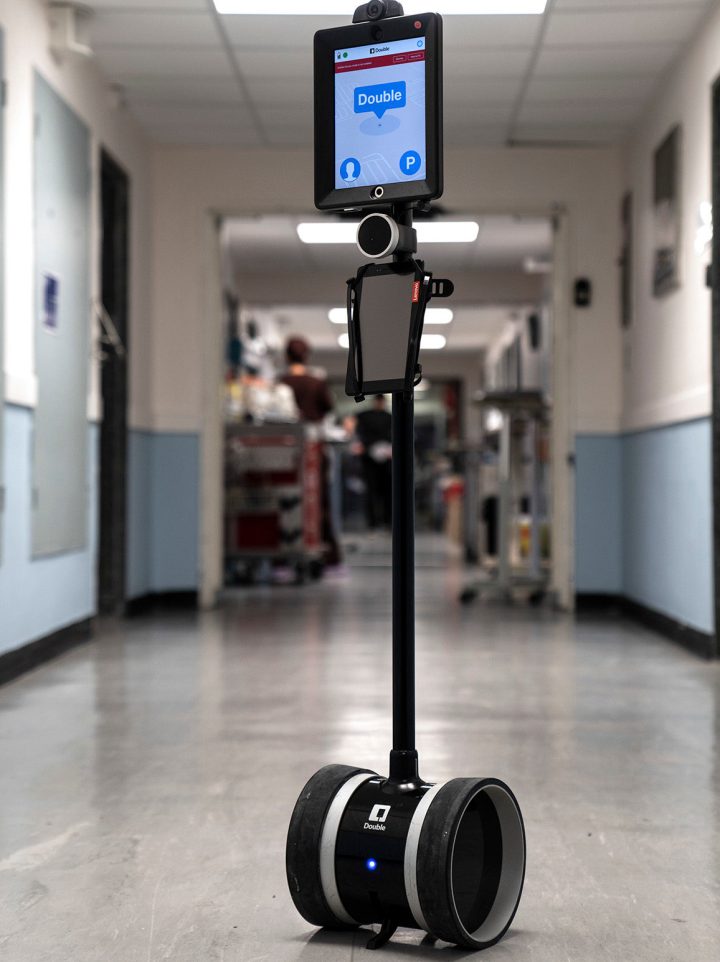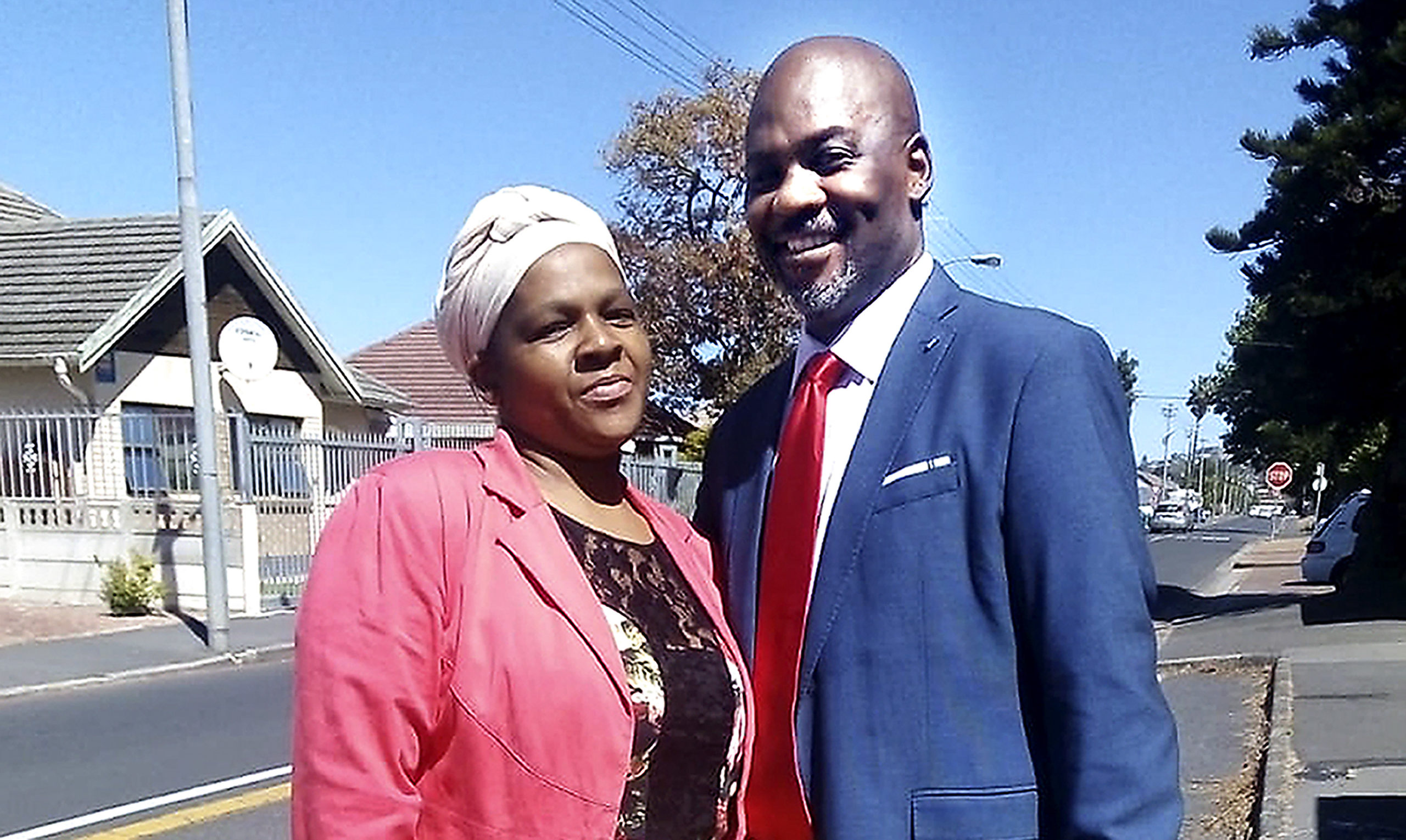SPOTLIGHT ON COVID-19
Quintin Quarantino: A robot called Quintin helps connect hospital patients in ICU with their loved ones

Inside Cape Town’s Tygerberg Hospital, there’s a robot affectionately named Quintin who is playing ‘his’ part in the fight against Covid-19.
Bellville’s Nceba Simayile, 50, serves as a pastor at the Kalkfontein and Kayamandi Baptist churches. Before becoming a church leader, he worked in banking. Simayile says he had never been in a hospital until 10 August, when he tested positive for Covid-19.
After being admitted to Tygerberg Hospital, he spent a marathon 46 days in the intensive care unit.
On 3 September, Simayile’s condition took a turn for the worse, leaving doctors no choice but to put him on a ventilator. The following day, ICU staff notified Simayile’s wife, Vuyelwa, that the end was near. They said she and the couple’s five children could say goodbye to him via a virtual meeting, with the help of Quintin the robot.
At the time of the virtual meeting, Simayile was heavily sedated.
“I remember feeling very confused,” Simayile tells Spotlight.
“I remember seeing Quintin; seeing my wife and my family at home, praying for me to live. People from the church were there in the house, praying for me. I was confused about why they were praying.
“I didn’t realise my hands were tied to the bed, and that there was this big pipe in my mouth. It was strange… not once did it cross my mind that I could die,” he says.
“Later my wife told me that on 4 September they had called her, saying I only had a few moments left to live. They briefed her before the meeting. They told her that I would be able to hear them but would not be able to respond.”
Fears of Simayile’s imminent demise proved unfounded.
On 7 September he regained consciousness and felt significantly better.
“I woke up and the doctor said it’s a miracle that I am alive. Not many people recover after being on a ventilator, they told me. Indeed it was a miracle… I believe it was seeing people praying for me when I was very sick.”

Pastor Nceba Simayile and and his wife Vuyelwa Simayile. (Photo: Supplied / Spotlight)
Who is Quintin?
A computer tablet on wheels, Quintin is equipped to make video and voice calls, allowing family members to “visit” patients in the ICU.
Since 25 August, the Double Robotics robot has helped several families to say goodbye to their sick loved ones for the last time. The meetings are kept private, with Quintin being steered remotely via a mobile phone app from outside the ward.
Clinical director of Sunskill Laboratory, Prof Ian Vlok, who is also head of Stellenbosch University’s neurosurgery division, says Quintin was named by staff at the hospital’s Covid-19 ICU. The name “Quintin Quarantino” is a play on the name of American film director Quentin Tarantino.
On the night of Simayile’s virtual prayer meeting, ICU staff were controlling Quintin.
“The doctor was there with Quintin the robot, so they obviously spoke to my wife beforehand, explaining what was going on,” says Simayile.
“My wife, and my family, my loved ones; it was a very bad experience for them, seeing me like that. I don’t wish it on anyone, but we are very grateful for that meeting, and the miracle of my survival.”
He recalls the lonely hours at the hospital.
“In ICU a nurse or doctor comes around every hour and a half. It was an amazing service. They were the best… they really monitor you.
“If anything happens, the doctor is there. But when they went away, my mind would start wandering. When these moments came, they were the worst moments of my life; remembering my loved ones.”
As he regained his strength, Simayile had more virtual meetings with his wife and children.
“For me to be able to speak to my wife via Quintin was good; it was comforting. Although not good enough, because love is about touch, about hugs.
“The only time my wife was happy was when I finally came home. For me, it helped to have a positive mind. I kept on thinking, I will come out of here healthy, one day. It calmed my nerves.”
A helper who never tires
Sunskill Laboratory owns Quintin and Vlok says once the pandemic has subsided, the helpful robot will return to the lab and continue assisting with training.
In March, Prof Coenie Koegelenberg from Stellenbosch University came up with the idea of using Quintin as a Covid-19 healthcare assistant who never gets tired and can never get infected. Later they decided to use Quintin for virtual meetings between patients and families to help reduce anxiety among those who were ill.
Koegelenberg, a pulmonologist, noted that it was difficult for healthcare workers to provide adequate psychological support while wearing masks and goggles “because they look like aliens, and it is difficult to hear”.
Quintin’s virtual meetings are usually controlled by volunteers from Stellenbosch University’s psychiatric department. They founded the “resiliency clinic” at Tygerberg Hospital to help staff cope with the onslaught of the pandemic.
At the moment, psychologist Maryke Hewett operates Quintin twice a week from a room adjoining the Covid-19 ICU.
At the height of the pandemic, when the ICU accommodated up to 30 patients, Hewett and her colleagues operated Quintin five days a week. Numbers have decreased considerably since then. The last time Hewett visited the ward, she said there were only six patients there.
“In the ward, things change so rapidly,” she adds.
“One day there are six patients; the next there are four. Patients are discharged or they pass away. There are crises all the time.
“The sisters and nurses at the ward were very concerned about the patients and families… about the lack of closure. So that’s how this initiative came about.”
The virtual meetings with Quintin normally last up to 30 minutes.
“If it’s the patient’s first time with Quintin, a nurse or sister will brief him or her, telling them what to expect,” says Hewett.
“If they are awake, we ask them who they want to speak to. For example, one patient said, ‘I don’t want to speak to my mum; I don’t want her to see me like this. I’d rather speak to my brother’. We want to empower patients like that,” she says.
“When we do virtual visits with patients who are unconscious or sedated and incubated, we give family members a description of what to expect. We tell them the patient has tubes in his or her mouth, and so on.
“It can be upsetting, so we prepare them. For example, we tell them that there will be no reciprocal engagement.”
End-of-life sessions
Of all the virtual meetings Hewett has arranged, four turned out to be the last before patients succumbed to the virus.
“When a person is worsening; when their vitals are dropping; we do end-of-life sessions,” she says.
Hewett says they ask the family members if they want to be there as this might be their last visit.
“People quickly get together… praying, singing. I leave them alone. I put my app on mute to give them privacy. It gets emotional.
“These goodbye sessions can be anything from five minutes to two hours. For end-of-life sessions, I normally tell the family, take your time.”
Meanwhile, Simayile is getting back on his feet, even though he has not yet returned to work.
“After the illness, I had to learn to walk all over again,” he says.
“But with the help of my wife and children, I am learning to get around again. I’m planning to be fully fit by December.” DM/MC
This article was produced for Spotlight – health journalism in the public interest. Sign up for our newsletter.
"Information pertaining to Covid-19, vaccines, how to control the spread of the virus and potential treatments is ever-changing. Under the South African Disaster Management Act Regulation 11(5)(c) it is prohibited to publish information through any medium with the intention to deceive people on government measures to address COVID-19. We are therefore disabling the comment section on this article in order to protect both the commenting member and ourselves from potential liability. Should you have additional information that you think we should know, please email [email protected]"





 Become an Insider
Become an Insider